#and there's definitely a racial aspect to it but i don't even want to make it about that because xenophobia is also a huge problem
Explore tagged Tumblr posts
Text
Religion and culture and their intersections always face the same savior attitudes, where outsiders who have no experience with those communities assume that the people in them are dumb savages who need to be saved from their own ignorance. The idea that we could not only be aware of issues in our communities but actually talking about them and trying to solve them just does not occur to people who want to play the role of the intelligent and rational heroes.
#this is partially because of that fucking anthropologist#but it's a constant issue in pretty much every facet of interacting with another culture#and there's definitely a racial aspect to it but i don't even want to make it about that because xenophobia is also a huge problem
194 notes
·
View notes
Text
My response to @mywitchyblog!
"Thank you for your response! I definitely have a deeper understanding of your perspective. I will make sure to answer your direct questions within your argument as soon as possible, as well as also clarify/highlight some of the points I made in my argument." - my initial response to your post
My stance: Race-changing is often (if not always) disrespectful and you shouldn't need to race-change to care about or try to understand another race
With that being said, I'll start again!
To answer your question about mixed people race-changing, I don't see why one would need to? Are you not those races??
Anyway, the practice of reality shifting, wherein individuals immerse themselves in alternate realities or dimensions, includes the controversial activity of race changing. You argue that race changing allows for profound personal growth, empathy development, and cultural competence. However, critics express concerns about cultural appropriation, racial fetishization, and racism. This essay critically examines the arguments for race changing in reality shifting, addressing its ethical implications and assessing the validity of its claimed benefits.
You and some others describe the practice as a deeply immersive experience that extends beyond physical transformation, including emotional and cultural integration. You say that this immersive experience fosters empathy and a nuanced understanding of different racial identities. However, this perspective oversimplifies the implications of embodying an entirely different racial identity, especially considering that race-changing practitioners can opt in and out of their new identities at will—a privilege not afforded to real individuals facing racial discrimination. Those who do so will always do it in a cavalier manner, since they can easily discard all social implications and conventions that exist. Vacationing to a life of discrimination is truly disheartening and fetishizing to see.
"Just wanting see" what the hell that is discrimination is like is backwards. What could be so interesting about a different race that you have to become it? If you strip every argument down, it will always lead to someone not fully respecting other races is-- They don't see it as something to be held in regard if they can easily cross that boundary.
While you claim that race changing enhances empathy by allowing individuals to experience life from a different racial perspective, this argument has limitations. Experiencing racial identity through shifting lacks the permanence and systemic context that characterize real-life racial experiences. Even if you shift to a new race, you will never inherit the deep-rooted understanding of what it means to be that race. Visiting another country does not make you automatically or intrinsically a part of it's culture for the virtue of you being there, and having a willingness to "learn", does not automatically translate to a willingness to be respectful of that culture or identity.
Shifters may encounter only a superficial or selective aspect of racial identity without enduring the lifelong societal challenges and discrimination that individuals of that race face. Thus, the empathy developed through such a practice might be more akin to a simulated experience rather than a genuine understanding of racial adversity.
Furthermore, while race changing might lead to personal reflection, the capacity for self-reflection does not naturally translate into a deeper or more accurate understanding of racial issues. Genuine empathy and social justice awareness require sustained engagement with real-world issues and communities, not merely temporary immersion in alternate realities.
Shifting for a few months or years does not an empathetic person make, or give you true understanding of an identity. What do you expect, you have someone call you a slur and suddenly you become a better and more understanding person, ready to fight discrimination every which way? Multiverse or not, that's not how people work.
You acknowledge that race changing can be seen as a form of cultural appropriation. That is because it is. Assuming a different racial identity, especially for temporary and frivolous purposes, does, in fact, trivialize and commodify the lived experiences of those races. You don't want it to be that way, but it is. You counter that shifters can engage with new cultures deeply and respectfully, integrating themselves fully into their desired identities.
Nevertheless, this perspective fails to address the fundamental issue that race changing involves choosing and discarding identities at will, an act that lacks the permanence and societal impact associated with real racial experiences. The practice risks perpetuating the notion that racial identities are interchangeable and can be explored without the enduring consequences of systemic racism, ergo, discarding the meaningfulness of these people and experiences.
Additionally, the ability to "opt out" of a racial identity undermines the reality of living with that identity, potentially reducing it to a mere fantasy or experiment, which for an incomprehensible amount of people, it is not.
The concern of racial fetishization is pertinent, as race changing might encourage the objectification or exoticization of racial identities. I argue that focusing on racial characteristics for personal or imaginative exploration can reinforce stereotypes and reduce complex identities to superficial traits.
You assert that the immersive nature of race changing fosters genuine cultural engagement and empathy. However, the risk of fetishization remains significant, particularly if the practice involves an emphasis on stereotypical or desirable aspects of a racial identity while neglecting its broader, more complex reality. It doesn't go away because you think there's very little evidence or weight to it. Effective engagement with racial identities requires more than temporary immersion; it demands a deep and respectful understanding of the lived experiences and systemic challenges faced by individuals of that race.
The argument that race changing is inherently centers on the notion that it minimizes the real struggles faced by marginalized racial groups. I believe that such practices can perpetuate harmful stereotypes and disregard the reality of racial oppression. Those who race-change often operate from a place of privilege, like a rich person pretending to be poor for the fun of it or the aesthetic.
Just as someone would rightfully side-eye said rich person, people of color have every right to side-eye race-changers, and people who enthusiastically support it (as you've said, people have the right to be offended; that's because it makes sense to be).
To address these concerns, it is essential for practitioners of race changing to engage critically with their motivations and the broader implications of their practice. Effective empathy and anti-racism require MORE than temporary experiences; they necessitate a sustained commitment to understanding and addressing real-world racial issues.
Having that "as long as we aren't weird about it, we can do it" mentality is a coverup; there's no way to be not weird about it, if you're already willing to cross that boundary. You can't say, "Oh, black people... Cool, cool... Let me see what that's like, looks interesting," and it not be weird. Race isn't a fashion that you can try on and discard later. It's not a enriching activity you can do with the family. It's a real and tangible identity that one random person on the internet can't just grapple or tackle on a whim, or even with careful thought.
In short, race changing in reality shifting may offer some insights into different racial perspectives, it also raises significant ethical concerns. The practice risks trivializing real racial experiences, reinforcing stereotypes, and perpetuating a superficial understanding of racial issues. For a meaningful engagement with racial diversity and empathy, it is crucial to approach these issues with a commitment to real-world understanding and systemic change, rather than relying on temporary, simulated experiences. Critical reflection and genuine engagement with racial communities (outside of reality shifting) are essential for fostering a deeper and more accurate understanding of racial identity and systemic inequality.
Thank you for your time.
#ubiquitous-icon 🩶#law of assumption#affirmations#neville goddard#manifesting#reality shifting#loassumption#shiftblr#manifestation#race changing
45 notes
·
View notes
Text
Death and Symbolism in Interview with the Vampire - Claudia
Disclaimer: I have only interacted with the AMC adaption of the story. While I am aware of a bit of the books, and may use that in support of my points, it is by no means substantial. Please feel free to add/disagree if you have read them.
In my previous installments of this analysis, I have established that Vampires are symbolic of death on multiple levels. We can examine the role of death in how it is delivered, how it manifests, what it means to be loved by it.
Now Claudia is complicated for a symbol for many reasons, but primarily because she's dead-twice-over. She haunts the narrative, daring to challenge Louis, and putting uncomfortable facts and ideas in her diaries that aren't meant to be interacted with by anyone but her. She never is given an ability to justify her actions, because she's always been dead, so we don't get to really see her moralize it as much as the other founding characters of the narrative.
The symbolism in Claudia is especially heavy. As I'm sure we're all aware, Claudia herself is a symbol of Anne's daughter, and that is just as influential in the context of how and why she is written as death as it is in Louis'. She isn't just the deliverer of death, she has death looming over her, just as a human does.
The Vampire Claudia
Claudia as a child is such an important part of her character that it's almost controversial that Claudia was aged up for the AMC adaption. Let me explain why I think that it still works, even if the direct symbolism has changed a bit. Fourteen is an odd age for a teen, because it's the age you are definitely feeling the chemical imbalance that comes with maturity. It's a fairly ugly age, as the transition between childhood and responsibility is confusing and frustrating, especially to the low-income racial reality that Claudia lived in. It also is socially an age of uncertainty. You are old enough to make decisions which you can (and should) be held responsible for, but you are young enough not to be treated in any degree of seriousness or respect. Claudia as a black woman just compounds this (black women both being seen as mature too early, but also infantilized in their own decisions). What future would she have had? It's unsure, especially in the tumultuous riots that caused her to be found by Regret in the first place. It's the age I believe many of us really begin to grasp the Death of Innocence.
Claudia is turned as a symbol of regret for Louis. She is not known as a person to Lestat or Louis, she was chosen because she was a little girl that Louis wanted to feel redeemed through. "She called me an angel." This lack of purpose haunts her death. She is always seeking ways to fill this hole, something that is reflected in the intensity for her thirst for blood. She doesn't know what her role is life is other than "daughter" and she hates how that infantilizes her. I'm going to give this complicated trait of hers symbolic of the Resentment of Death.
Claudia's lust for life is such an interesting aspect of her character. She seeks out these new experiences in her victims, as she tries to make peace with her Resentment. Her romance with Charlie, feeling so new and fresh, dying just like everyone else. Paying deep attention to the last words of her victims. I think about the one that we directly saw on screen "What date is it? ...I thought it would be summer." Because Claudia is confronting each of her victims with their death in the moment, they respond in confusing or confrontational ways, creating a resentful death. Even her first kill, she rejects the easy drunk man and goes for a cop (good for her), who tells her "You're not a girl, you're a devil." There is no seduction, there is no production, there is only meeting death and the resentment that comes from it. The more that Claudia can't find peace from it, the more resentful of those around her she becomes.
Now once we get through her Madness state in New Orleans, we don't get much on the character of her victims, and more on the other uses for them. She keeps pieces of them, like her drawer of breasts, for this search in what she is missing. The farmers for their language and looting soldiers for their goods in Eastern Europe, and those she kills to pick-pocket in Paris. These bodies are just for uses, and once she's done with their use then back to ashes it is for them. She seems resentful they they get to live at all, and she's much further along than Louis in seeing herself as "other."
Claudia is the one who makes the plan to kill Lestat. She is intent on killing what she perceives as the source of her ignorance and her Death. She resents Louis for holding on to the type of love that she associates with this innocence and ignorance. As soon as something begins to go wrong, she's quick to resent him for it as well. I think it's reasonable that when Claudia decided to take on the role of Louis' sister, she aligned her thinking with something along the lines of believing Louis himself is childish, especially when he exhibits the traits she associates with her own childishness/helplessness. Claudia's Death of Childhood Innocence reflects back at her when she associates it with weakness.
This is also pretty closely connected with why she finds the Theatre so compelling. Resentment often finds a degree of comfort in Cruelty, and of course the Theatre displays campy, random, cruel death as its feature. "You are all complicit, repugnant, and appaling! And... I love you for it." Something that Resentment would find peace in, especially as Claudia has been exhibiting these traits anyway, but they have the addition of luring their victims into a "loving" embrace. "Do you know what it means to be loved by Death? Do you know what it means to have Death know your name? ...no pain." And Claudia so desperately wants to be loved.
But Cruelty is all about causing pain, and Armand and the Coven cut deep. The minstrel show highlighting her childishness that she associates with weakness, the deep connotations of racism, the use of the trapped bird that can never be free metaphor... There is sickening cruelty in the Theatre's seduction into death. Even letting the victims come screaming onto stage just to taunt them with human selfishness tells us this. It's a False Love that they promise. The Justification tells Resentment that this is just how it is, and you need to suck it up or perish. And Claudia has never endured cruelty well (as she should, this shit sucks).
Now Claudia is haunted by a particular Death symbol. Fire and Sunlight. Fire in IwtV is primarily a symbol for destruction, as one of the ways to both kill a vampire and cleanse evidence of their victims. Death is the polar opposite to light, and thus, to the vampires it is something that they cannot exist in. Fire/Light are both symbolic of life, and since vampires are dead, they cannot stand in the sunlight (don't ask me about old vampires walking in the sunlight, I don't have an answer for that yet). It is used as both a threat and a choice. Each of the people who have harmed her directly have had control of fire (Lestat, Armand, and Louis).
Fire is why she meets her death via Louis, his justice setting off a passionate destruction of his community. "Auntie told me to stay put and stay away from the door." Her aunt kneeling on the wrong side of the door, dead as she tried to get to that little girl. Playing with sunlight to burn her own skin, watching Charlie melt into a puddle. Tossing the book "etiquette for girls" into the fire. The old vampire matron who tasted her blood then threw herself into the hearth. Lit up by sunlight to be burn to death. Claudia is haunted by destruction, at the very hands of the people she overwhelmingly needs to trust.
But light is also a symbol for hope, which is why Claudia burns herself. She's looking for hope, even as it hurts her. She is burned by a misused hope for a future, and the Dramatic, Cruel, and Justified hands of death. And why Madeline, who dresses her in sunshine yellow, is Claudia's hope.
We see a lot of why Claudia is attracted to Madeline through the Death of Innocence, and Resentful Death. Madeline's family died when she was very young, and she has done quite a lot of things that other people resent her for (sleeping with the Nazi captain.) Within Madeline, Claudia sees a bit of herself, but in the desired body of an older sarcastic woman who treats her with that exchange of respect Claudia craves, and is willing to look past the monster to see and understand her.
So what is it to be loved by Resentment and Innocence? It's not friendly. It'll blame you for things out of your control, as well as the things in your control. It'll be possessive and often unforgiving. But it'll be the kind of thing you can't ever get over, that has buried its claws in your chest with ever moment of connection. You're never the same after being loved by it, or by loving it.
#claudia#claudia eparvier#claudia de lioncourt#claudia de pointe du lac#interview with the vampire#interview with the vampire meta#iwtv#death symbolism#vampire symbolism#death and symbolism
12 notes
·
View notes
Note
Hi! I was wondering do you know why Loumand is so hated ? Was it like that for books readers too? I'm in the middle of the 1st book but i do like their fucked up dynamic on the show and if you ask me, i do think there is love between them.
It's funny because when I started following the fandom everyone was saying how vampires are poly and how we'll have to adapt to this fact now that i'm finally adapting my view, i keep reading ''Louis and Armand don't love each other'' etc.. people call us delusional... sometimes i feel like the only accepted poly is Lestat? I love all their dynamics,give me anything, i'm just here to see characters doing unhinged things that's what attracted me to the show,but sometimes i feel like people just want conventional stories despite what they are saying.
... well.
Okay, so, I'm not too hot on them either. I'll try to explain (and please do read until the end^^) Because while there's certainly love between them (and I have always maintained that!!) - there's also the "problem" that Armand initially becomes interested in Louis... because he is Lestat's. He engages Louis after Lestat has told him about Louis, tries to keep them (Louis and Claudia) save.
Armand... manipulates Louis, and canonically influences him to turn Madeleine, spell-binds him, lies to him, puts a "veil" onto him.
The show, very early on, hinted at the darker aspects of Loumand with the posters, and their reference to the movie "Gaslight".
Armand... Armand has baggage. And luckily(!) he falls for Louis. From his side it's definitely not a lie that he loves Louis. Louis... Louis is certainly infatuated. I do think he loves Armand. But... not like that. Both show and books make that quite clear, and their later canon time together is a very sedated safe time at Trinity Gate.
Armand later tells in his own book that in Paris:
"I must have Louis, that was my injunction. I knew no other."
He must have Louis.
Armand... is someone who does things as he sees fit, even if others disagree. Hunting the young vampires down, for example, even in modern times, wherever he is. Lestat is later very loathe to do that, but Armand keeps wherever he is "clean". The ever multiplying vampire population is for example why Louis goes to Armand at Trinity Gate for the first place - to be safe. But that just as a note.
So... I think it's... complicated. :)
It should go without saying(!) that you can enjoy them as you wish^^.
I think... I think a lot of people are very unprepared to watch a show like this (with characters like these), because we rarely get to see something like this! Like, all these relationships are toxic!! All of them are flawed. There is no good or bad vampire. They're all manipulative, toxic serial killers. They all abuse, and are abused. Yes, even Louis. :))
Fandoms... sometimes tend to be very polemic. This fandom has had the added complexity of the racial recasts, a setup as a tale and a show that has put its fingers into wounds... and then not only split the first season in half, but was also delayed by strikes. Some things... festered.
BUT. That should not stop you from enjoying what you enjoy?! I can only recommend curating your dash^^, and enjoy them.
It's a wild dynamic after all, and while I personally did not think they would go so dark for them I do see the appeal of diving into this dynamic :)
So - look for those who enjoy them as well, and... forget the rest?^^
#Anonymous#ask nalyra#iwtv s2#iwtv#amc iwtv#interview with the vampire#interview with the vampire s2#amc interview with the vampire#louis de pointe du lac#armand#loumand
33 notes
·
View notes
Note
Hey. I know you're probably getting a lot of hate for your mismag opinions, and I don't want to be one of those voices or be dismissive of your concerns. I'm Jewish and trans (though admittedly transmasc. I will say, that though JK's virulent transphobia has mostly been centered around victimizing trans men, it's important to remember that the entire community is affected. Her claims that transmasc folks are just confused little girls is dehumanizing and patronizing. We should stand with our trans sisters who are being endangered first and foremost, but also acknowledge that there is no part of the community that is unhurt by her bigotry.) Anyways, that said... I personally disagree with your mismag takes. I think you're well within your right not to support a series platforming the Terf book, and I do agree with many of your takes. But one of the distinctions I don't see a lot of people making is the difference between criticizing the Harry Potter series and criticizing JK Rowling herself. I'm not advocating for the Harry Potter books, or claiming death of the author. Those books are filled with prejudice.
But, though JK has made her current platform off of horrible transphobia, the books themselves weren't as preoccupied with trans people as she's become. Yes, there are definite transphobic elements. But to me, the biggest glaring issues of the book come from the racism and the worldbuilding (specifically the "fantasy racism" of muggles/mud bloods and all that shoddy allegory entails) --- both aspects that are directly critiqued and centered in mismag.
Saying that Mismag isn't a satire because it doesn't center a takedown of the transphobia of Jk Rowling is a misunderstanding of how it functions as a satire. Not criticizing JK (aside from Fuck Terfs) so much as criticizing the book and the world itself. I think there are issues with it, no doubt! And I certainly wish a transfemme individual had been given a seat at the table, not as a token, but because their insight into the world would add an extra dimension to the intended criticism.
But I also think that saying it doesn't qualify as a Parody is sorta... ignoring the racial components. It's unfair to Aabria and unfair to the show as a whole.
thanks for your opinion. I don't agree that transphobia (transmisogyny specifically) isn't baked into every aspect of her books.
Remember Pansy Parkinson? Remember how she was described as pig faced, square jawed, short haired and mannish? Remember how she was a villain who did awful things and ultimately aided the in world version of "fantasy Nazis"?
Remember umbridge? Another woman characterized as wide, mannish, square jawed and shouldered, someone who would LITERALLY transform to spy on people, get into kids bedrooms, "invade spaces".
Remember the staircases to the dorm rooms? The ones that wouldn't let boys into the girls rooms but would let girls into the boys rooms? This isn't even all of it.
I'm absolutely in no way saying the books and Rowling currently aren't FILLED with racism. I am indigenous, her use of "spirit animals" as patronuses is despicable. Rowling isn't currently spending thousands of dollars pushing laws against black, Asian, or indigenous people though. She IS currently funding politicians who are pushing holocaust denial AND spending direct money advocating for laws targeted at specifically trans women.
It is irresponsible and incredibly tone deaf to release a season based on her books when violence and trans people, trans women specifically, is at an all time high.
18 notes
·
View notes
Text
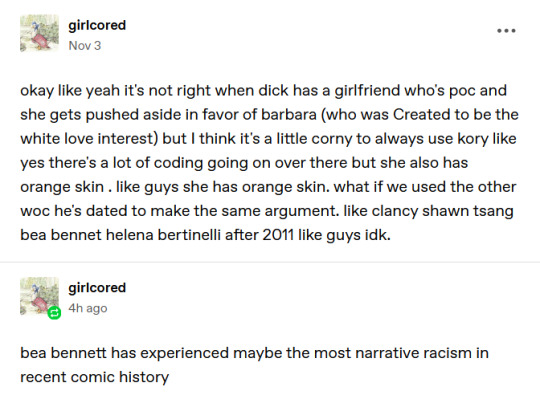
making this a new post because i want to add relevant tags and elaborate on what i mean here. all panels from nightwing (2016) #108
there's the issue of dick pushing bea aside to be with barbara
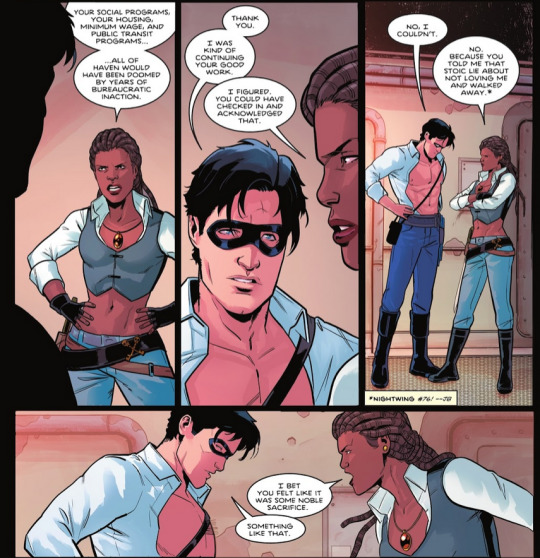
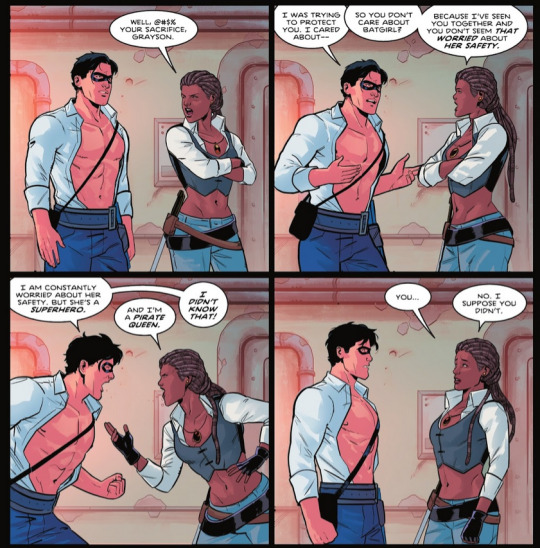
there's plenty of other posts exploring the issues with this and i did too in my original post. like yeah there is definitely a racial aspect here
2. bea is the adopted child of a secret pirate society in bludhaven. her adoptive brother, a white man, claims to be the "true" heir

a) ignoring that this reads like this supporter of her brother is calling bea a racial slur b) you can't write this and then ignore the racial dynamics that are absolutely at play here. nowhere in this comic is it even mentioned that white members of the crew might not accept bea as the heir because of her race, even though in a story that is at least based in reality, this is absolutely true. c) when race dynamics are not addressed, it leaves me with this really uncomfortable feeling. like the characters are doing racism and it's not addressed to a point where it's ignored, which isn't what i need or want. i don't need my hand to be held when discerning the meaning of a text. i do need certain things actually written down for them to be part of that meaning. otherwise it feels like disregarding the racial aspect of this conflict to a harmful degree.
even if the purpose of this arc was to explore the racism bea faces, in not doing so in an explicit way, the story itself is being racist to her. like guys idk. tom taylor what the fuck is wrong with you.
3) bea getting fucking stabbed by her white nationalist brother
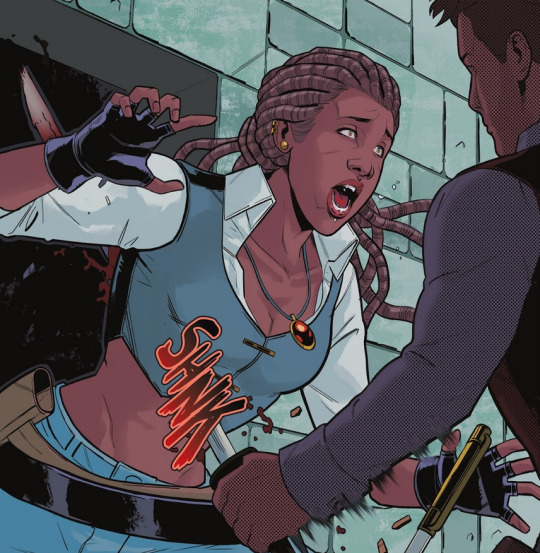
hey um. why'd you do that.
and i am saying all of this as someone who fucking hates the ric grayson arc and does genuinely enjoy dickbabs. i just don't see anyone else talking about this and it's wild. it's wild that tom taylor is just getting away with this
43 notes
·
View notes
Text
Metaphor Re:Fantazio 6/2
Time to begin.
The game opens up and the story's narrator welcomes us and asks our name.
The fact the line asking for OUR name is in red and the game says "You will name the Protagonist later" tells me that there were challenges explaining this to play testers.
We get the big philosophical question right from the start.
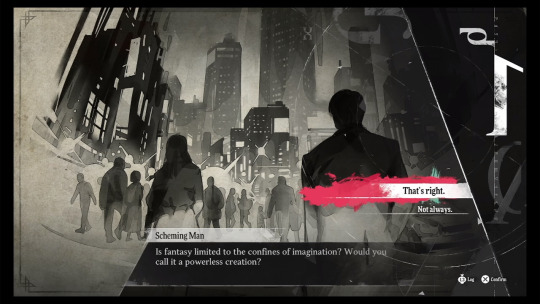
Personally, I prefer picking "Not always." I feel like fantasy is a means for people to consider what can be. The world never changes for the better if you can't imagine a better one.
Since this is the very beginning, the game opens up by introducing as many concepts as it can. The opening cutscene shows us an igniter and establishes the protagonist's racial status of elda.
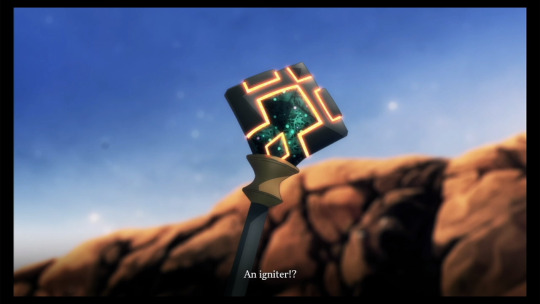
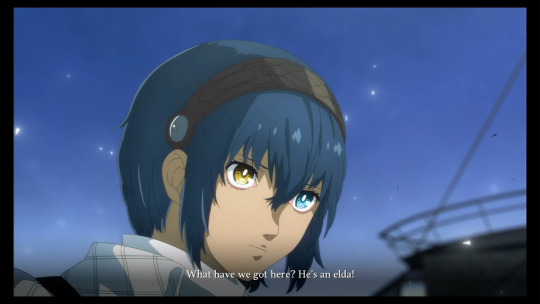
In a lot of fantasy settings, the human-equivalent race is the normal race and all the others are part of the story's fantastical elements. Metaphor is flipping that script a bit by saying the other races are the mundane ones and eldas, with their lack of distinguishing features, are the strange ones.
I don't think it's too much of a spoiler to say she'll join us later, but I just want to point out that her starting weapon is a lance.
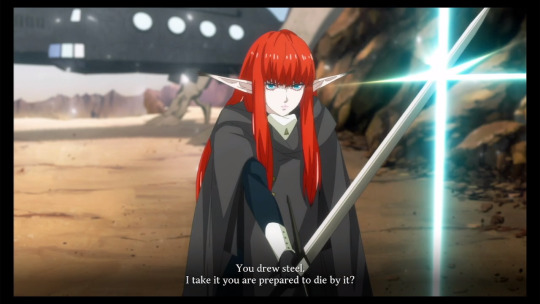
The game has a database called the Memorandum that explains a lot of stuff. I think the game does a solid job explaining everything without needing to access the Memorandum, but people like lore.
The first four entries you get are your fairy companion Gallica, the primary religion Sanctism, magic igniters, and Guantlet runners. Sanctism is specially worth mentioning because nothing about the opening cutscene references the church. The game just felt it is important that you know this from the start.
Gallica suggests avoiding monsters and you really should.

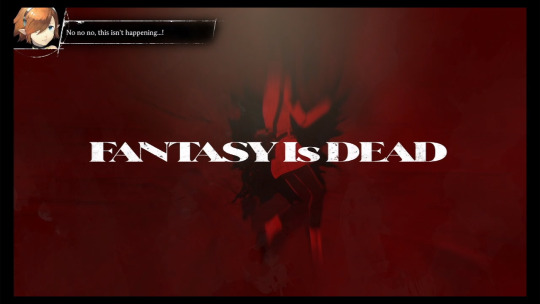
It's always neat when aspects of the media are integrated into the story. This isn't background music. It's a spell Gallica cast. So what was the music that played during the earlier cutscene?
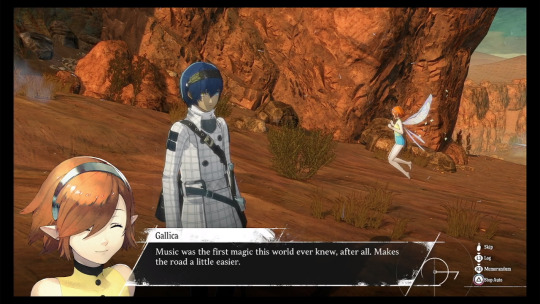
The music lyrics are in Esperanto. I guess that means fairies speak Esperanto natively.
Every item pickup is labeled "Item(?)". I don't think there are any shinies that aren't items though.
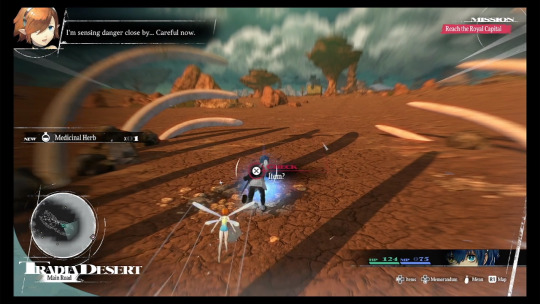
Do those worms have an eye in the middle of their grabber tongues?
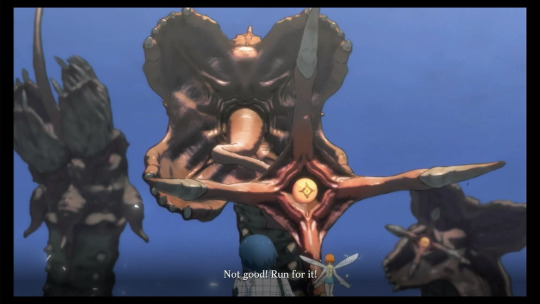
I can't help but laugh at how the coat of arms for Euchronia includes what looks like the Tumblr logo.
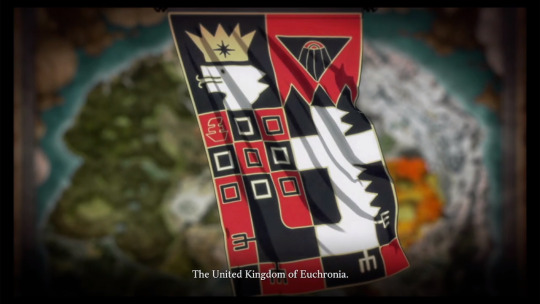
"No mortal mind remembers the heroic tales upon which their land was built." There's another meaning to this line when we get further in the game, but for now this is part of the case the story is making that fantasy has a place and is a necessary part to making a better world.
This line is placed alongside other current issues such as conflict and disparity among the tribes. Not only is there a lot of turmoil, but there's nothing that can serve as an ideal.
First thing we see in the capital is the bright, clean upper levels populated by Clemar and Roussainte. Then we go to the dirtier lower levels and see a Paripus being executed while several Clemar and Roussainte jeer at him.
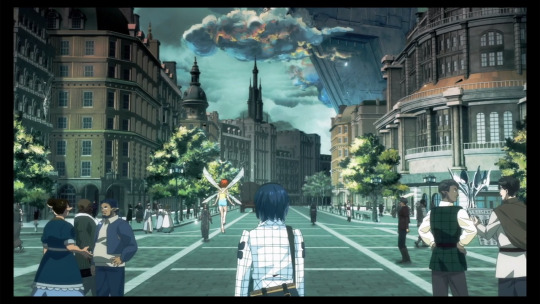
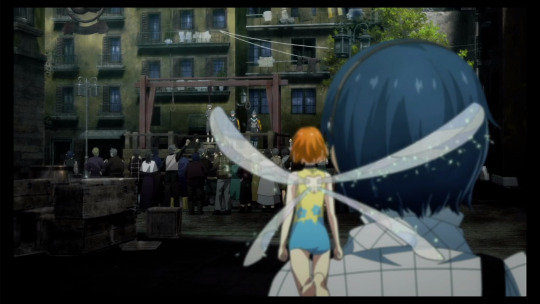
Really strong first impression of Grand Trad. It looks immaculate and ideal, but that's only if you're the right tribe. The Clemar and Roussainte don't have to fear poverty or an unjust legal system. And some of them even use it for entertainment.
And there's more necessary info-dumping needed to catch the player up. Gallica has mentioned a mission a few times, and you almost always have the option to say you don't know what she's talking about.
Turns out the prince has been bound by a curse for the last 10 years and you're trying to break it. The mission is to infiltrate the military to get in contact with a certain person who might be able to help.
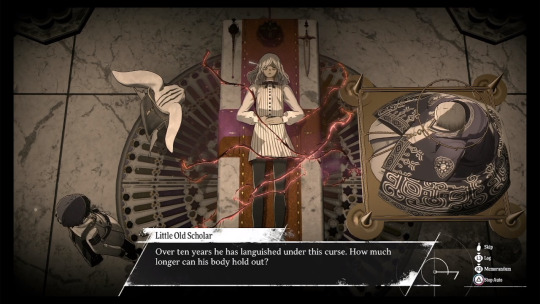
So now we have the general idea of the game's setting, a long-term goal for the story, and a more immediate objective for the player to follow. And the game got through it within the first 15 minutes of gameplay.
This character is most definitely no one of any gameplay or story importance. She's just "Paripus Woman" and the dev team just wanted you to know what she looks like.
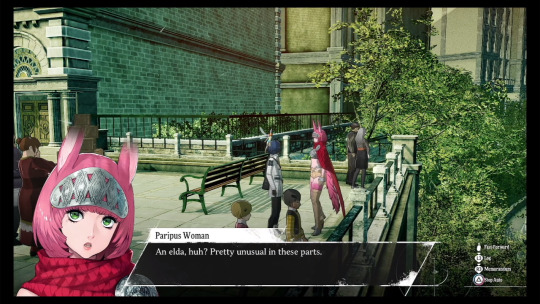
I've never caught onto it, but I might as well point it out. I've heard that the reason the Igniter woman approached the protagonist when he was looking at the igniters was because she didn't want an elda next to her store and wanted him to leave.
Mechanically though, it's just a way to bring up the Royal Scepter.
A lot of entries appear in the Memorandum to explain each topic brought up in more detail. The only one worth mentioning is Forden, the head of the Sanctist Church appears in the Memorandum unprompted when you enter the Regalith Grand Cathedral.
There was a bounty hunter talking with a soldier about a Paripus bounty hunter named Catherina. She sounds cool. Maybe I'll get to meet her. I hope she joins my party.
I love how there are so many little animations among the NPCs. There are children drawing on the concrete while another is playing hop-scotch.
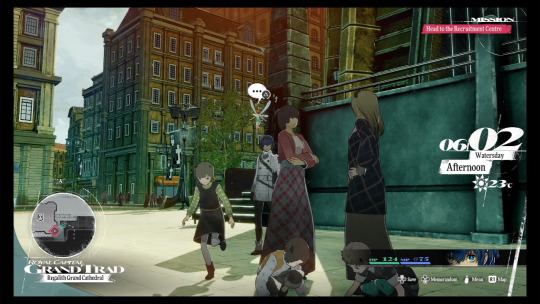
Honestly, I liked Captain Klinger when he first appeared. He's a colossal jerk, but he was notably more cordial to the protagonist than he was to the noble recruit he was talking to before you. And when the average reaction from people is disgust at your existence, a neutral tone when speaking feels like the most open-hearted thing imaginable.
The captain's question decides your starting stats. Whichever you pick will give you additional stats to strength, magic, endurance, agility, and luck respectively.
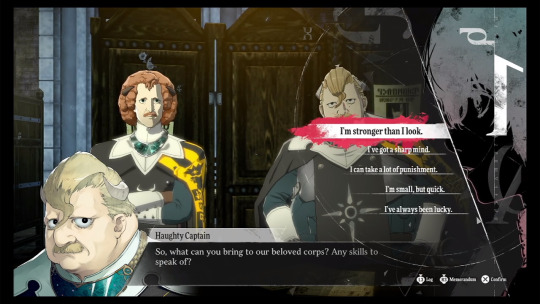
I personally think luck and agility are the best stats. Luck determines item drops, crit rates, afflicting, being afflicted by, and recovering from status ailments. Agility affects accuracy and evasion.
Strength is better than magic in the long run especially once you learn physical attacks with elemental properties. Physical attacks can crit while magic attacks cannot.
Endurance reduces the damage you take. But if you can dodge everything, you don't really need it.
For my first playthrough, I chose agility as my main stat cause I want the extra starting boost to speed. For my second, I chose strength. For my third, I chose luck cause that's going to be the only reason my third guy is going to accomplish anything.
Then we got to naming the protagonist. For the first playthrough, I named him Darin for no reason at all. For the second playthrough, I named him Darrin. For the third, I named him Timi for no reason at all. Going forward, I'm going to use Darin to refer to the protagonist.
If you change language settings, your character's name gets set to a different default name. In English and Japanese, his default name is "Will". Various other languages use different names and each default name is based on famous royalty.
There's a gold beetle you can find in one of the hallways in the recruitment centre. You enter the hall, turn around, and it's right there in the corner next to the entrance you just came through.
It took several hours to get through that equipment line.
He stood up for me. He's my new bestest buddy.
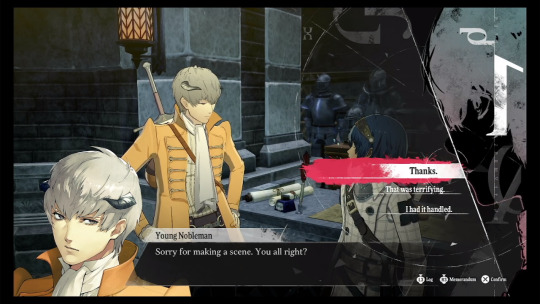
I like how you can choose to be openly upset about the prejudice you suffer as an elda to Gallica. And it's something that you can tie into the earlier question about whether or not fantasy is just meaningless imagination. You can choose to either make Darin start off hurt and wishing for a better world or make him jaded and somewhat indifferent to his suffering.
The story book has a weird inversion of some things. We might make fantasy stories about various tribes and magic and noble kings and think they would be an ideal world. But the characters in the story are telling us that none of that makes an ideal world.
Meanwhile in this fantasy story, they are looking at our world and think it's an ideal world. And naturally, we would say our world is not anywhere near as ideal as they think it is.
And hopefully, the player might think a little about their initial reaction to Gallica's fantasy. Do you wish it were real, or do you scoff at her naiveté?
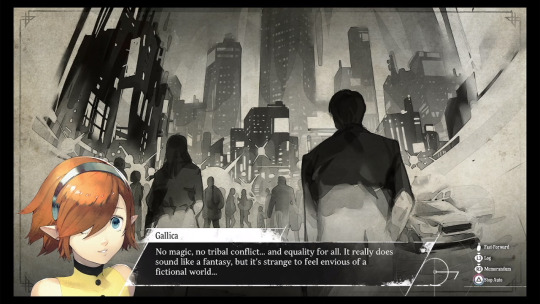
back
Spoiler Discussion
The end of the intro says Euchronia is a land of 8 tribes. However there are actually 9. The most likely reason is because the elda are so hidden away that they're usually not considered. But when we learn the origins, it might not be correct to call elda a tribe like the other ones.
Anxiety is a keyword throughout this story and it's first mentioned at the end of the intro. "Anxiety breeds dissent among the tribes."
The statement at the end of the intro is addressed to the player. The player is asked to grant guidance. And that kind of is what we do as the player.
You having the option to be clueless about your mission and then get a cutscene where you're given the mission is the first hint that there's something off about Darin. he doesn't know the mission because he wasn't actually there when it was given.
back
4 notes
·
View notes
Note
TBH, I don't consider reducing/hiding scars a minor pet peeve at all. Activists for facial differences have been talking for years about 'disfigurement' being used as shorthand for moral failings. I could blame wanting to lighten the burden on makeup artists, but there's never any hesitation to make villains scarred. It's only if the character is meant to be sexy or heroic that their scars get toned down or removed.
DEFINITELY!
I think there are many aspects to this, the biggest one being the one you mentioned, this dynamic of villain = scarred, hero = not scarred.
And another thing that I hate about it is how especially in adaptions they take a facial difference and make it much smaller, less visible, move it etc. - and then try to pull off the same narrative about this character being perceived as not conventionally attractive. Which immediately becomes incredibly condescending and makes it even worse, especially when they choose a conventionally good-looking character to play that role.
An example:
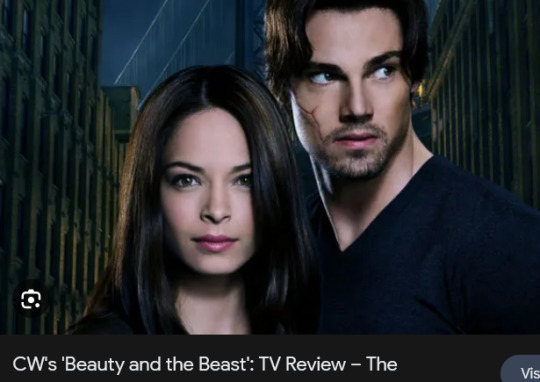

He is supposed to look "monstrous" - like bro, what does that make the rest of us?
(And just to make the dehumanisation of people with facial differences more obvious: In the source material, this guy had half-lion features)
Another aspect I can think of is the fetishisation of self-hatred in this regard. It is portrayed as "good" when a character with a facial difference (especially a woman, in these tropes) puts herself down - but then in swoops a love-interest to tell how beautiful they are. Meanwhile, a character with a facial difference or something similiar who - for themselves - says: "Hey, actually I like the way I look" - is treated as arrogant and the butt-end of the joke. (There is this Colleen Hoover book I'm thinking of here, as one example, that in my defence I only watched a pretty scathing review of)
But I also think that there are some racial aspects and gender aspects to this. There are probably a lot of people more qualified to talk about these racial aspects of this and maybe I am imagining things or don't see the full scope of it but I definitely feel like they feel far more comfortable doing this "villains have scars" thing with characters of colour - at least relative to the amount of representation characters of colour get to begin with. And it feels like...well, again, I'm not the best person to put this into words but since it usually goes hand in hand with the villain-trope, it feels like an effort to dial up the othering, especially in older shows and movies that use stuff like rituals or something for shock value. To make other races or cultures look sCaRy and DifFeReNt.
Or - just the first example that comes to my mind: The original mirror-verse episode of Star Trek. The reason I'm mentioning this is because it is a piece of media where you can see side-by-side which visual cues writers settled on to make our characters look "evil": One is dialling up the sexy - especially with the women who are all much more horny - another is giving mirror!Sulu a big facial scar. And on the surface level, the reasoning even makes sense - that world is a lot more brutal so it makes sense that someone would have scars. But for one, there is the interesting choice to make Sulu the character to give it to. Not to mention: Our "normal"-verse characters also see fights and injuries. They could have scars very reasonably. Star Trek is all about inclusivity - but there is a notable absence of e.g. scarring of visible body differences in the original show - they even used body doubles and selective shots to hide James Doohan's missing finger. But the moment we go into an "evil" universe, there is facial difference and it is on the body of a man of colour.
And then you have the issue that female characters must not have visible scars in most cases - because they have to be eye-candy for the audience. And considering the huge pressure that is already placed on women to be beautiful, it feels like another body standard in the media ("we will show women suffering in all shapes all the time to the point of being exploitative, but also they heal back perfectly and don't appear changed at all. So the audience gets to eat their misogyny cake and eat it too.) Meanwhile, some male hero characters (usually action heroes, video game heroes) do get to have scars or some facial difference to show their "journey" and how much they hardened and what they survived - which I think can be a positive message - "hey, your scars talk about what you went through and what you survived and that you're a badass!" - but women get this to a much smaller degree despite having extra tons of pressure placed upon them to look beautiful so it feels really cool (also - referring back to my first point, self-empowerment is also treated as negative and almost egomanical because informing a woman that she is beautiful is a man's job)
(An example: I watched a a Netflix adaption of a book I had read recently and in the book, two major female characters have an identical scar on their face and that is pretty relevant to the story - and they just decide to place in the palms of her hands instead where it is much less visible and the scenario behind the first woman's injury becomes a lot less believable than the one in the novel)
And the thing is, I don't even always buy that it to save on make-up or effects in a lot of cases because often they are productions that have tons of budget for other things and a lot of movies and shows can show their characters for half the episode/movie with scrapes on their face and blood on their face etc. I have a hard time believing that this is so much harder to do than a scar.
40 notes
·
View notes
Text
i think one thing that's especially awful about the dm fandom is indeed the way so many white fans are eager to play off the racism as like. Just a character flaw or quirk, even when the work does seem to treat it otherwise
these are thoughts i have considered for a while formulated based reading what Black bloggers have had to say and brought on by this post but i didn't want to derail that at all
white fans treating laios' ignorance of toshiro's name as a cute thing. no it was racist. laios just breezed over toshiro's name and maybe he originally did so because he didn't like... adequately listen/understand toshiro, and that was because of the autism. that reason isn't acceptable and certainly not an excuse. laios just brushing over a name with an origin in a (let's say) non-"Common" language is racist.
and marcille's racism is both very real and when it is portrayed, it's clearly shown as a problem... tbh though, i think the fact that the narrative focuses more on how she patronizes falin as a result of the elves' paternalistic attitude toward short-lived races (not that it does this a ton, exactly, but it's more relevant to the story than her racism toward orcs), while her frankly cruel and callous ignorance toward the orcs is contained strongly in a few chapters and addressed in an afterschool-special-y way where she never offers a meaningful apology but more just um. a grudging acknowledgment of the fact that orcs are people? is sloppy handling. that one post about how marcille is conservative is incredibly true and while she starts to learn better, i don't think we get to see enough of that learning process for it to be meaningful. and it's definitely not one of the funnier aspects of marcille's character??
this isn't to say that the work itself isn't racist, or that its approach to racism in the narrative is good. fantasy racism as an allegory is a bad concept, i think - dungeon meshi may do a few things better, insofar as the bar is under the ground.
part of it is simply making all these races actually human, and then making it clear that the distinction between human and non-human sapient races arbitrary to the point of basically being an excuse. number of bones?? however, this also touches on a flaw of the work imo; a lot of these issues are touched upon in canon, yes, but only in supplemental materials as opposed to the narrative proper.
another thing that i perceived is that the oppressed groups actually do not pose nor are they presented as genuinely posing any threat to the oppressors (again a bar under the ground thing, this shouldn't be noteworthy). like, the orcs are painted as violent and malicious by other races in-universe, but it's not like. predator-prey dynamics between them and other humans, or the orcs having ~dangerous powers~ that would supposedly justify their oppression.
and yet. that doesn't make the the presentation of orcs less racist in the context of reality. like using racialized features more heavily on characters who are also depicted visually as more animalistic. the orcs' positioning in the narrative is undercut by this, along with the lack of Black and brown characters of other human races. like yeah there's not literally zero but those that are there are indeed often not drawn/rendered well AND in a narrative work that is evidently trying to think about race, this issue stands out even more. or it should.
i do think dm tries to address the idea of race in the work. ultimately i don't think it succeeds very well. however all of this was originally intended to just be about how frusrating it is that white fans refuse to engage with any of this in favor of laios as autistic blorbo and farcille... i think it's like. even when a story is actively trying to be about race as a social and political issue, this still gets not only glossed over but sometimes even like! actively de-politicized and de-racialized! "there's nothing racist about dungeon meshi" yes there is! just because you relate to laios doesn't mean he wasn't racist! just because the work is thinking about race doesn't make IT not racist. but rather than engage with that at all, we apparently want to pretend it's just Flawless Fantasy Fun
9 notes
·
View notes
Note
Sorry, I have returned with another heavy representation related question
Do you find it odd that the push for black characters is disproportionately higher than the push for black culture?
Aside from all the interesting history and cultures in Africa, there's aboriginal Australians and Afro-Brazilians who invented an entire martial art to escape slavery and fight off colonizers. Capoeira is awesome btw
Why represent black people, but ignore black culture?
Good question!
I don't know if I have a great answer to this, but if I were to start anywhere, it's that part of it is definitely because of just how significant the U.S. is (or at least is treated) in how culture moves, shapes, and released. In the risk of sounding like a baby leftist eager to use buzzwords all the time, honestly it all ties back to capitalism. What sells, generating profit, buying out smaller companies for their better critical acclaim-to-commercial success ratio.
And a notable cog in the capitalist machine is what U.S. corporations do as, despite being an extremely young country, it is a superpower with massive amounts of land and wealth that it hoards. It stands to reason that anything that comes out of the U.S. can and will be marketed and capitalized off of if it reaches a certain point of popularity and/or notoriety.
Black American culture is one part in that American capitalist cog, where, despite being a proported bastian of modern day human rights, the U.S. values the dollar of the world's citizenry over actually making efforts to improve the damn planet they live on.
And true to that type of attitude, that resulted in Black American art at first being mocked ("a Negro wrote a book? yeah and pigs can fly haha"), then the 'emancipation' happened (ignore the fact that slavery technically still exists under the 13th amendment as punishment for crime and doubly ignore which racial population is drastically over-arrested and accused for crimes of which they either didn't do or have outrageous sentences compared to the crime committed e.g. weed posession, the U.S. doesn't want you to think about that) /s
After mockery, came mockery+profit, such as minstrelsy, and later whitewashing and theft of cultural aspects (music is a big one) at the expense of Black Americans not getting their due.
Then the Civil Rights era happened (ignore how socialist MLK was that's not good for the money making machine) and with that led to a more rapid dissolution of segregation, and that meant Black people can be on screen and can sell stuff to other Black people. Later, Black culture started becoming really cool and hip to non-Black people in America. White boy hip-hop, white guy and gal R&B (Timberlake, P!nk's first album), whatever the hell X-tina was doing with those damn cornrows lmaoooo.
And this corporate co-opting of the culture has proven to be a major money maker for the past 5 decades, and is still perpetuated today. Any accusation, claim, or slander of "Gen Z/TikTok/Stan Twitter" language is how Black Americans have been talking for decades upon decades (I wish I could remember there was this show from early days of color tv that had a black cop do a "white to black" translation as a joke on the show and he said "my partner wants the tea on the old bird" cuz that's really a big indicator of that fact.)
The double edged sword of this, is of course that this is a way of speaking, culture, art, and lifestyle that a group of people live, and despite it continuing to be marketable as trendy and cool, Black Americans are still not really getting the lion's share of praise for it, because well... the U.S. is still systemically racist and any trend that starts from a non-lighter skinned cultural/ethnic group that can be whitewashed, will be in order to sell more. Unconscious bias as a result of being raised in a country built upon injustice and genocide is something I don't imagine will be undone for even the next century or two.
Getting to the actual point you asked about, it's because of the topics in my aforementioned ramblings why it's most likely harder/less seen for Black culture to be pushed over just Black/dark skinned characters.
On one hand, yes, I did mention how Black culture has been commercialized and commodified, but 1) lots of overt racists still exist and celebrating or even explaining something adjacent to Black culture can and will set them off cuz "THE WOKE AGENDA, STOP PREACHING IN MY FAVORITE FRANCHISE GRRRR" which means a not-insignificant amount of money can potentially be risked since those types are in more spaces than you'd expect, 2) there's extra work to be done now as to not offend the particular culture being portrayed, which is a good thing to do, but sadly often results in said culture just being cut from a character to avoid the work because time spent on sensitivity can be taken as time wasted on not improving other parts of the product, and 3) I know this is a big accusation to make, but... people consume more subpar and shallow stuff than they're willing to admit. Obviously there's nuance to stuff; enjoying a children's show with black characters in it as a kid and thinking it's good representation is no problem whatsoever, in fact I encourage it more because diverse cartoons set developing kids' brains up extremely well for a progressing society.
But there's a very noticeable deluge of applause from even mature audiences when there's a major involvement of a Black person in general that rings hollow because there's usually nothing significant about it other than the produce may not have had Black involvement before. I myself am not immune to this of course, because my favorite game series' are Fire Emblem and Xenoblade, and only in the most recent entries of both did they feature unambiguously Black characters inspired by either cultural taste aesthetics (Timerra and Fogado from Latin America) or physical features (Taion's hair, nose and lips), and I basically fucking cheered cuz those are my babies and they look so cute. BUT, again, those were the most recent entries in series where characters darker skinned than a paper bag (or gray-ish brown) that weren't just insignifanct NPCs were hard to find, and in FE's case got outright fucking offensive (Danved/Devdan).
I suspect this is a similar sentinment with non-American Black culture as well, as since Black American culture is still a controversial celebration, African, Carribean, Black Latin, or Aboriginals of Australia have the same reputation except exacerbated by xenophobia, weird fetishy-exoticism being placed on them, or flat out being unknown to the greater zeitgeist at the moment. Certainly doesn't help that the major powers of entertainment are located in the places that ruined or exterminated those same Black cultures :/
TL;DR: Capitalism profits off of culture, but not too much because that risks losing more money than its worth, so the compromise is usually slapping a "they're black" sticker on whatever they're trying to sell and unfortunately it works a lot of the time because being an uncritical consumer is something we've been raised to deal with as a part of life.
8 notes
·
View notes
Text
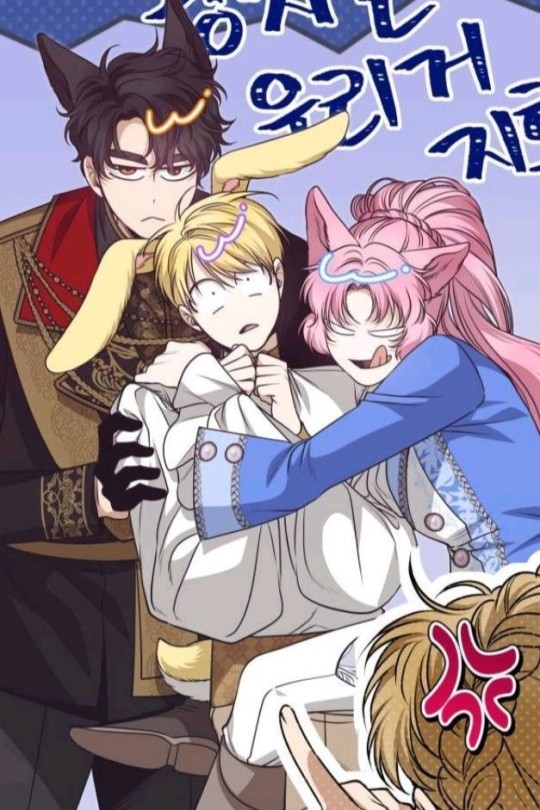
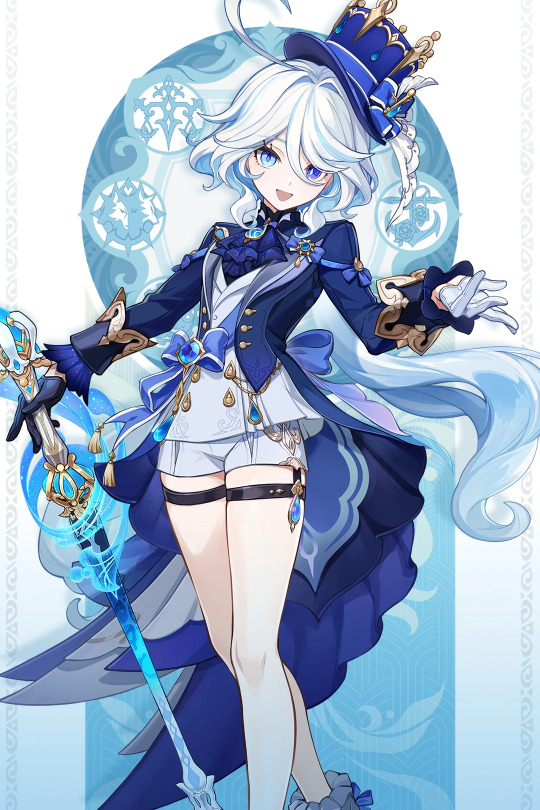
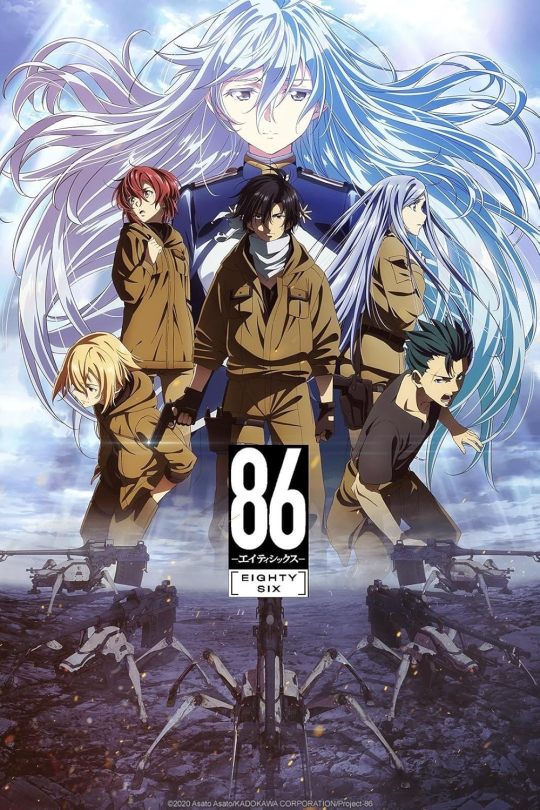
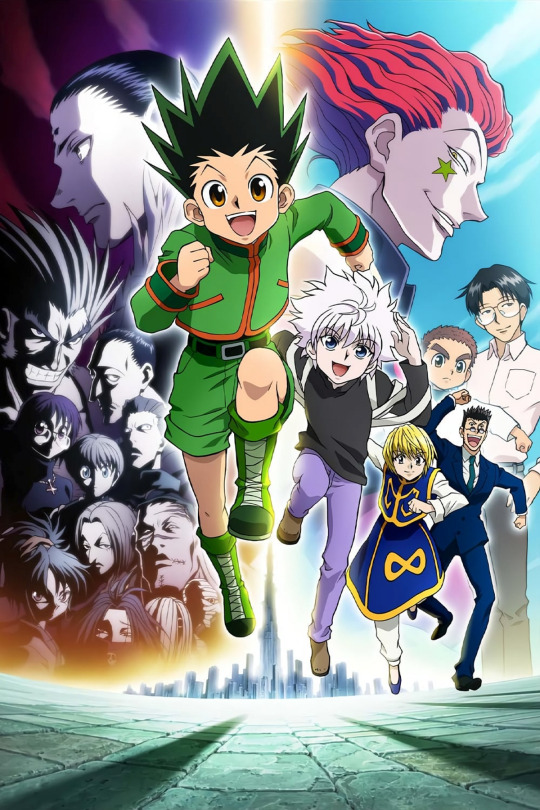
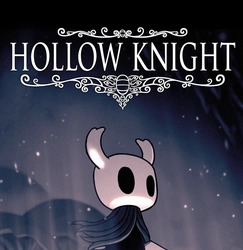
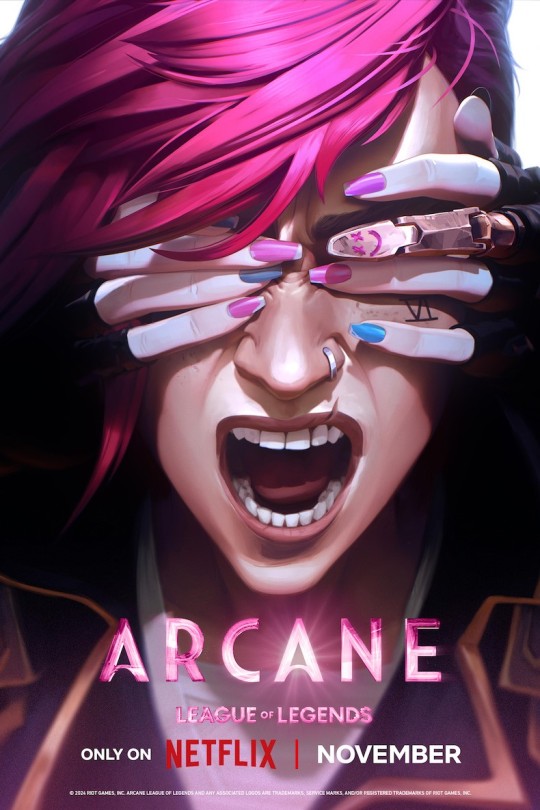
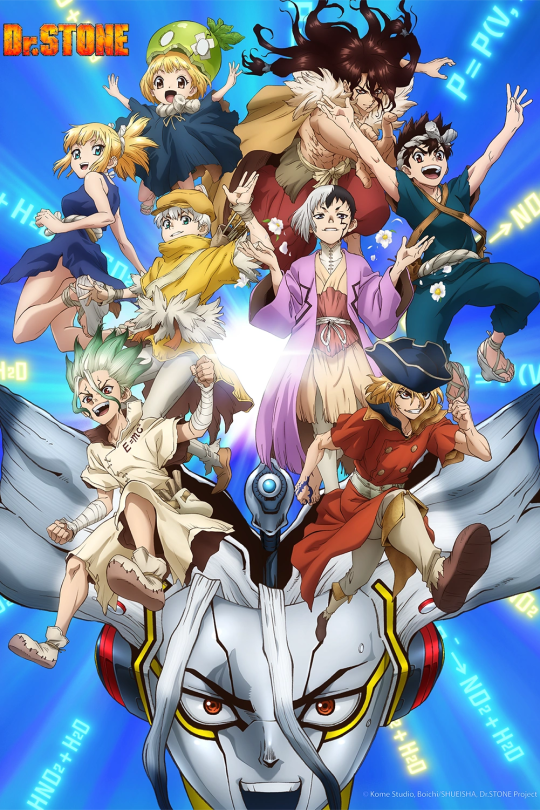
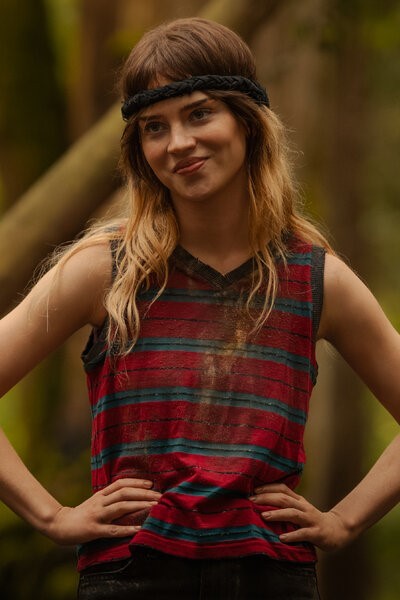
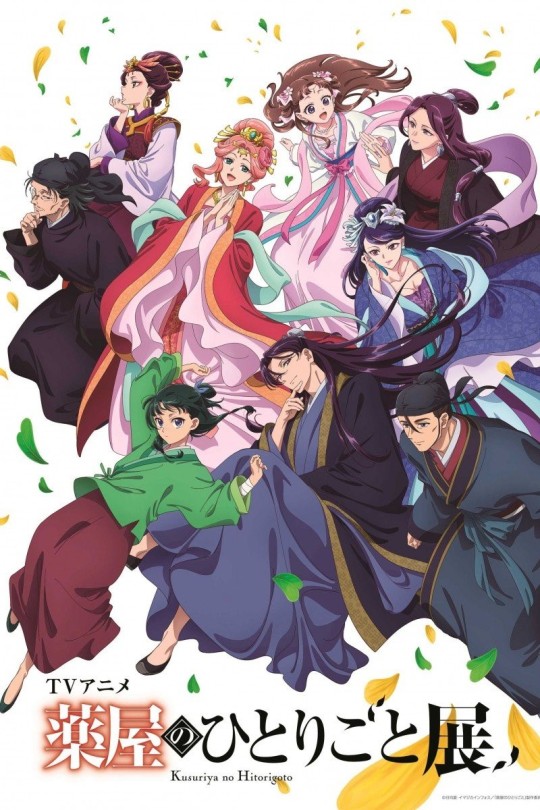
Bimonthly Media Roundup
Lots of media this month in an attempt to escape the horrors. Along with the things on this list I also caught up with several other webcomics, watched random episodes of Star Trek with my dad, watched last week tonight, am keeping up with some youtuber Danganronpa playthroughs, and have started watching Danny Motta's various commentary on FMA, OWL House, PMMM, ect.
- When the Third Wheel Strikes Back (Webcomic) - Caught up, I do definitely think the story is a lot better now that the characters are well established and the political drama is in full swing. Also love the poly trio we got going on here -MC who's aware he is in a love triangle but unaware he is the axis due to heteronormativity is admittedly a very funny dynamic, wish I saw it more.
- Genshin Impact (Video Games) - My great luck with 5 stars pulled through with my beloved Furina, giving me her on my 2nd try. Wrio however took a 50/50 failure then like 80 more pulls, thanks man. I did get a C6 Charlotte out it though, so excited to see how she'll play.
- 86 (Anime) - Very solid Sci-Fi anime about a fascist nation using its underclass as disposable soldiers against an AI controlled superior power. This is based on a novel series and does feature better writing than I'm used to in these kinds of shows, the upper-class utilizes the depressingly realistic techniques of controlling and lying in media, dehumanizing the underclass, and constantly deflecting responsibility to make themselves feel righteous and superior while the underclass has a healthy level of anger and mistrust towards even the nicer members of the upper class as while they realize they are not inherently evil, they are complicit in a system actively genocide the underclass and therefore any kindness not directly tied to policy changes feels patronizing at best. Good stuff. The 2 leads are complex and likable with a good slow burn dynamic between them, and it's nice to follow them individually as well as together. The rest of the cast is likable but fairly basic in their characterization and design, the show is certainly more interested in the leads emotional states as child soldiers and the wider politics of war, which to be fair is done pretty well. The animation, pacing, and writing is all good as well, the only times I could say I was bored was in the rare instances of extended robot fights - usually the strategy was interesting enough to make up for it but when it was just robots shooting at each-other I did check out. I don't have any major issues with the series, though I do have 3 nitpicks -1. Why are a couple people psychic, you didn't need to do that, 2. The child soldiers being desperate to fight as it's all they know is good but it's frustrating that the adults keep letting them, even the adults in power that state they don't want them to fight but are not utilizing that power to stop them, and 3. While I think the ending was a satisfying with an emotional high and pretty neat use of shifting aspect ratios to make pretty visuals, it was an arc ending not a series ending - it's very obvious there's far more of the story that would need to be adapted that the studio seems to have no plans to act on, meaning if you want a conclusion you'll have to read the light novels. Tentatively 8/0 though, I was quite impressed.
- Hunter x Hunter (Anime) - Alright well another long anime down, honestly maybe we should just watch Case Closed before we run out of shows. Hunter Hunter was definitely good, each arc had a unique premise and structure with a good sense of escalation and a solid supporting cast, its got a decent sense of humor (especially with facial expressions and anti-climaxes), I really like Gon and Killuas little childhood puppy love thing they got going on and Killua in general, it has a couple well designed and respected racially diverse and trans characters which was nice, and overall it was just a very bingeable and fun show to watch with another person. I will say some of the arcs tended to drag a bit in the latter half, and while I think the power system is generally fine I didn't usually find the fights very interesting, the abilities being way better utilized when the characters are solving puzzles, getting around obstacles, or laying traps than in one on on combat. To be fair there's far more of the latter than the former though. In typical shounen fashion there's far more male than female characters though for the most part its surprisingly respectful, at least in having very little moments of fan service or implying that women can't be as competent or powerful as men. The trade off is an uncomfortable amount of adults making sexual advancements towards children being played off as jokes, including a whole ass adult woman going on a date with a grade schooler and never being demonized by the narrative for it. Bad. While it wasn't Made in Abyss season 2 levels of disgusting enough to make me stop watching, it did spoil an otherwise really good narrative (as well as character, Hisoka having the Sanji issue of being a really likable character outside of that one awful trait that kinda ruins it). Oh well, I'd still say it was overall well done with unique locations and obstacles with a good mix of satisfying predictability and surprising twists. Certainly one of the better Shounen.
- Hollow Knight (Video Game) - Was able to get past a part I was stuck at, though I'm still more lost than found in this world. I do love my new giant sword beetle dad though. Anyway still very adorable, pretty, and frustrating game.
- Arcane (TV) - Great fics and art, wish the fandom would stop arguing over dumb teen stuff but oh well.
- Dr Stone (Anime) - This has kinda been the season where my recurring response to every episode is just. Sure whatever, this may as well happen. I am still enjoying it, I like Senku and the absurd little contraptions they make but man is it ridiculous. Apparently this is the final season so I'm interested to see how the plot gets resolved. Is it aliens? Why not.
- Yellowjackets (TV) - Like with Season 1 I do feel like the present timeline story line is dragging in season 3 - There are interesting things happening but too few and far in between. Cutting back to the past is always refreshing though. Anyway the last shot of the last episode was insane, can't wait to see where this goes.
- The Apothecary Diaries (Anime) - 2nd season has been great so far as expected, though I do miss Jinshi a bit. I like that the show isn't primarily a romance and Maomao is free to do her own thing and have plots separate from him of course, but their dynamic is a lot of fun and serves as levity to the darker tone the solo Maomao stories seem to have. The anime is catching up top the manga faster than I expected it too, I wonder if it will start adapting straight from the light novels or just stop for awhile so the manga can catch up.
Listening To: Monster by Dodie, Clueless by Beach Bunny, Jericho by Iniko, EPIC album, Fox Hunt by Sierra Ferrell, A Little Bit Off by Five Finger Death Punch, Price of Perfection by Katherine Lynn-Rose, Fantastic, Rainbow Connection, and Stick Season by Reinaeiry, Do Everything Now by Saint Motel, Let Me Drown and Midnight Ride by Orville Peck, Family Line by Conan Gray, She Likes a Boy by Nxdia
2 notes
·
View notes
Note
(You don't have to reply to this publicly if you don't want to)
I read your post on adoption trauma and it really hit close to home for me. My adoption experience was a lot different (same race adoption, domestic vs international, bad adoptive parents, etc) but I still feel a lot of the same frustrations.
I can't claim to understand through racial aspect and I don't want to equate my experience to that (that's a whole other level of hurt I can't even imagine), but I think it's important to note that there's another culture that gets lost in adoption: *familial* culture.
I don't know my genealogy. I don't know how my family celebrates holidays. I don't know their little inside jokes and how they show affection and all their favorite things. I don't know my half-siblings but they know me. They know our mother. They know her hugs, her smile, her laugh.
And even though I know *who* my parents are and I could contact them, it still feels like forcing a piece from another puzzle into a completed one. I will never have that relationship with them. Of course, that's my personal experience and I know it's different for others, but that's how it feels for me. That rift is permanent, even if I take the risk of rejection and try to build a bridge.
Anyway, didn't mean to blabber in your inbox. Just had a lot of feelings and thought I might share. Also hi, I have a whump blog as well lol. It's @the-whumpening but most of my stuff has some of your squicks so don't feel obligated to check it out.
Oh yeah, there is definitely a loss of familial culture for both of us. I didn’t highlight it because I thought it was just an implied, a given -but you’re totally right, it is there, and we should address it.
I don’t know my genealogy either, or how my birth family observes holidays like Lunar New Year, Mid Autumn Moon Festival, Qing Ming, and the rest. I don’t know if you care about such things like religion but I don’t even know what mine practiced, or if it’s a faith I would have preferred to grow up in. I know I have a blood sibling; that much is implied through my story, but aside from that, I can only make guesses.
I think it’s cool though that you *know* who your birth parents are -something that will be a miracle for me to find- and I fully respect your decision to not want to contact them, but it must be kinda weird, I imagine, for both of us to imagine a world without our rifts you so accurately mentioned…
Thanks for chiming in! If you want to talk about it more feel free to message me.
7 notes
·
View notes
Note
Hey! I'm sending you a message because I love your fanfic, Beneath The Mask. It's really immersive! Your writing is so impressive, and your Alastor and Charlie feel so real! You really display every part of them so well, from their attire to their mannerisms and inner thoughts. And you balance it with your amazing plot so masterfully! I'm curious as to what resources you use when you research the place and time period. It's because I'm working on my own Charlastor fanfic in the same setting (1920's-1930's New Orleans). You're a writer that I look up to, so I thought I'd reach out to ask you for advice. Thanks!
Aw, thank you! I'm glad to hear that you're enjoying my work that much. :D
Well, odd as it is to say, when it comes to researching the 1930s, YouTube is a fantastic place to start. There are loads of documentaries about the roaring twenties, as well as the Great Depression, uploaded on there that go into great detail about everything from daily life, to fashion, to racial and societal tensions, to even old diary entries, and whenever I'm doing something I don't want to, I'll put on one of those so the grind of vacuuming doesn't seem nearly so monotonous.
However, I would recommend not just listening to the ones about the economy and the stock market crash. While they do play an integral part in what went down back then and are definitely worth a listen, it's vital to take into account the human suffering on the ground level that occurred at the time, too.
Wall Street is important, but Main Street is everything.
People were starving, dying in the streets, and kicked out of their homes because they couldn't pay the rent. Poverty was rampant, loads of families had to uproot across state lines, just to survive, and the dust bowl was sweeping through the US farming country, making it unviable for planting and raising livestock. Civil unrest was all over the place, debt, both personal and commercial, was at an all time high, roughly 25% of all working Americans were unemployed, riots and police standoffs were occurring everywhere one looked, like what happened with the bonus army in 1932 in DC, and brutality and scapegoating were the way of the day, with random acts of violence against one other on the rise every day that went by, regardless of whether or not there was even a reason, be it perceived or real.
So, the human struggle against scarcity, despair, misery and hopelessness that the Depression brought which persisted throughout that time period is essential to take into account when writing about it, as it affected almost everyone and usually stayed with them to some degree for the rest of their lives, even long after the depression itself was gone.
Which is why a lot of old people who lived through it never threw anything away, eschewed any and all kinds of waste, and washed and folded up used tinfoil, among other things.
Another important aspect about the Great Depression and the roaring twenties that proceeded it is that everything is intertwined and connected with each other to an almost disturbing degree. For instance, the release of labor saving devices, shiny new inventions and household appliances, such as electric washing machines, radios, cars and what have you, behooved people to take on a boatload of debt in order to purchase them, which, in turn, put them into a bad financial position when the bottom fell out of the economy and they'd no way of paying their loans back because they were without a job.
The banks going bust and there not being any sort of insurance to cover the financial losses at the time didn't help, either.
Hemlines in skirts also have a way of either rising or falling depending on the state of the economy as well. If it's a bull market, the hemlines rise. If it's a bear, they fall down to the floor.
Also, the YouTube channel, 'Great Depression cooking with Clara', is a great window back into life in the days, so I'd look that up too, if you're so inclined.
As for fashion knowledge, I'd recommend either vintage dancer or glamour daze. They've got loads of tutorials for makeup and fashion from the turn of the century all the way up into the 80s, as well as real life magazine articles from back then, detailing how women, and sometimes men, were expected to dress in order to appear 'smart' in public, as being well groomed was a sign that one still had their act together, if only on the surface.
Hope that helps!
#bathsaltsmcgee#Q and A#B answers stuff#a history of the depression#Thank you for coming to my TED talk#I know way more about this era than I probably should#Nobody get me started on the differences between art deco art nouveau and art modern#you'll be here all night
8 notes
·
View notes
Note
Hi
Say if Joan said yes to travelling with the doctor, but Martha didn’t like the idea and gave the doctor an ultimatum who do you think he would choose? Like I want to ship Ten/Martha, but the whole Joan thing is kinda stopping me. Sorry if this is a weird question - I just wanted to see someone else’s thought’s on the matter.
I think he would ultimately choose Martha. Because I'm sure Martha's ultimatum would entail more about her understanding that he's trying to get Joan out of guilt, but ulimately not wanting to be around someone who is racially prejudiced. Martha has already been in a backwards time for too long, we don't want to bring it with them, especially as it wouldn't just affect Martha but the Doctor too. Race is a problem from what we know but she'd definitely start othering the Doctor. I do really think he asks for Joan out of guilt.
Additionally the awareness that Joan could very well become socially aware is a thing but ultimately, that is not Martha's responsibility, and if the Doctor wishes it to be his, then Martha is within her right not to be a part of it. Also I truly believe that the Doctor would regret his decision to travel with her. Firstly, I do not believe Joan has the aptitude to be a companion. She'd probably die on their first adventure. Also Joan is incredibly bland, I think the Doctor would get bored easily.
I think the Doctor offered her a trip because he assumed she'd be more impressed with him instead of the fake. Joan never seemed too impressed with the Doctor from the story to begin with though. Interested but not that interested. And I think he'd get a kick out of showing a woman from 1913 the universe. I also think Joan was probably embarassed to fall in love with a story than a real person.
But ultimately I think he would choose Martha. I think when he talks to Joan, again I think it's out of guilt. When he speaks to Martha outside, she clearly knew what he was trying to do. Remember when John asked Martha why she didn't stop him and Joan falling for each other? Martha saying that wasn't on the list? The fault ultimately lies with the Doctor missing one of the most fundamental aspects of humanity. That is the alien making a massive error. So, he tries to placate it. I look at the scene both ways because as awful and manipulative as it seems, you can't help but feel sorry for the Doctor as you see how he is crashing and burning without realising. He just doesn't get it. But I think Martha does, and would tell him.
I think Martha would have laid it out in this ultimatum if he proposed to want to get Joan to accompany them out of guilt. The Doctor thinks a trip in the Tardis is an adequate thank you, it's partly how he got Martha in the first place. He's not self aware enough to understand why he'd be rejected (even at the end of the Runaway Bride, The Lazarus Experiment and ultimately the end of the series). But Martha. I think the core of Martha's ultimatum would also be that she is here for him.
The Doctor makes many mistakes this two parter, some out of ignorance, some under duress. In the show, when Martha offers to speak to Joan, I think she wantes to try and convince her not to travel with them exactly, but to not to think too harshly of the Doctor. As Joan and John came at her, all Martha did was defend the Doctor. Martha Jones understands him better than most companions in my opinion. I'd think she would want to come at the angle of two humans regarding the Doctor. I don't think she'd convince her, but I think she'd want to lower Joan's hate. And give her something to think abput regarding her society in general.
And I think this consideration, and understanding from Martha telling the Doctor that she would try to help ease his guilt, just not at the cost of her own sanity. And the Doctor would choose her.
#doctor who#martha jones#tenth doctor#10th doctor#joan redfern#human nature#the family of blood#tenmartha
11 notes
·
View notes
Text
Actually I want to come back to this because it is So Correct
Vague manga spoilers ahead for Senshi's backstory
Senshi's doting, caring nature is so deeply parental (and slightly condescending but that's another can of worms) and I feel like ppl often forget this bc they really want to fuck Senshi (understandable), but a crucial element of his characterization is that he feels that his duty as an adult is to keep children fed. Like this shit preoccupies him A LOT:
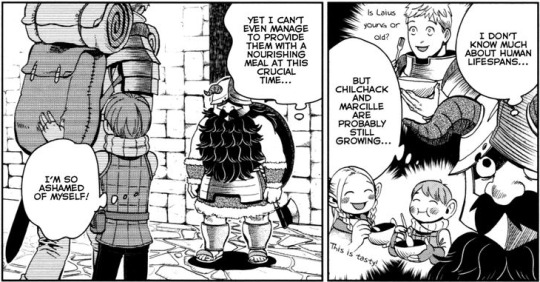
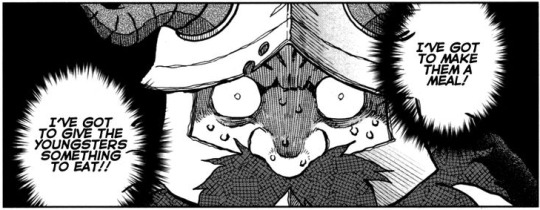
You also see it in the shapeshifter chapter, how his mental image of Chilchuck and, to a lesser degree, Laios, are young and child-like. Marcille not so much, but the screenshot above absolutely establishes that he sees her as a still growing kid.
And the fact that he feels it is his duty to feed them because they are children is an essential part of his backstory! Because someone did this for him when he was a child, and he's the last survivor of his party because he was a child and protecting the kids is the most important thing. Like, this shit sits deep!!
He's not a lover (frankly, considering how much time he has spent happily isolated from all other humans, I'm not even sure he needs human connection at all), he's a caretaker, and I realize the definitions can have some overlap but like. Senshi is so strongly established as nurturing in an extremely parental way? He takes care of the ecosystem because he feels like the dungeon needs him. He feeds the party because he sees a gaggle of hungry kids that need him.
And- I do think in contrast to the other party members, who are all shown to have some kind of interest in sex and romance (Chilchuck has a wife and three kids, Marcille is a sucker for romance books, Laios is very interested in monster reproduction and at least thought his fiancée was "cute"), Senshi stands out by his complete and utter disinterest for the whole thing? The closest he gets to the topic is his incredibly awkward attempt at giving Chilchuck the birds and bees talk, which he does only because he feels like it is his duty as an adult responsible for a (perceived) young child.
Anyway this is my disjointed essay on why Senshi categorically does not fuck and especially isn't fucking any of the party members and also how his caring nature is deepy interwoven with a moral imperative to make sure children (and young humans) are fed and cared for.
(and don't get me started on the racialized and ignorant aspects of it all this post is already getting too fucking long)
yes senshi is built like a bear and gets all the pantyshots and can cook like a god but also that man is the most asexual character in the whole fuckign series. he has absolutely nothing going on in that department. dude has miso soup where his sexuality would be
7K notes
·
View notes
Note
https://x.com/tashisbob/status/1924236092754055405
so I just want to ask, what's your thoughts on this? I've felt like I am discontented with how so many of the challengers fandom have such reductive interpretations of art's character as either tashi's victim (he's not), or patrick's mean double-crossing snake friend (which I HATE, and I'll yap about it in a bit).
personally, i think this thread one of the more compelling explorations of art's dark side as a character. definitely more compelling than "art is a meanie, because he ditched his friend! 😡". maybe bc I am a fellow shady passive aggressive girlie, but I do understand why art would act the way he is, and that it can come across as insensitive at best, and manipulative at worst, to a lot of people, whether or not it is intentional or not.
I guess one thing that I wish more people will talk about is how much art's actions and behavior is a product of the system he grew up in. he's just as much a victim of the athletic industrial complex, as tashi and patrick are (or arguably, even more, given that his image and likeness is exploited and commodified... like as termed by the hosts of one of my fave podcast, "fame is abuse"). and I'd love for people to touch on art's character and connect it to the struggles of having "invisible" illnesses (i.e. burn-out, depression), and how it causes people to function in less desirable manners, or even lash out, and no matter what you do, you can't even communicate or describe just how "sick" you are, and people will call you entitled or insensitive, because of your behavior. I think untile then, idk if we can truly say that we have a nuanced reading of art's character. (also why I think the longer og version of art's monologue in the sauna is crucial to his character, as it exposes both his unsavory traits and sympathetic aspects of his character, and it's a shame that we don't see it in the actual film, and I do wonder if people will interpret art differently had it been kept. but whatever)
... THAT SAID, it must be said that, whether or not he is conscious of it, the privilege that comes with art's whiteness and maleness DOES introduce an uncomfortable dimension to his character and interactions with tashi. like yes, he's suffering from his isolation and burn-out, but he gets to lash out and manifest his signs of suffering, with minimal consequences, because HE'S a white man. the tennis institution contributed to his suffering, yes. but it continues to uplift him and celebrate him, despite his losing streak, because he is a white man.
it is also very telling how a lot of viewers are so much more forgiving and sympathetic towards him, compared to tashi. and I do think that he's not conscious of a lot of the privileges, but nevertheless, he still benefits greatly from his white male privilege
and it's something I appreciated that the thread brings up, because imo, it introduces a complexity to artashi's dynamic. obviously, it brings into this idea that the racial dynamics at play will never be I tashi's favor. it doesn't excuse tashi's behavior and acknowledges that she's not perfect, and in fact, her imperfectness gets amplified. and on his part, art gets to lash out, whether or not he's conscious of his privilege.
and I do think this is definitely a more compelling read of art's relationship, rather than how a lot of people talk about his friendship with patrick, because WAY too many people hyperfocus on the stanford incident to make the argument that art is a "bad friend", even though the film shows that there is enough ambiguity to show that art screaming at patrick to gtfo could be a myriad of other reasons than swooping in to steal tashi. like my main problem with the discussions that ensure is that unlike a discussion of artashi's relationship in its most dysfunctional, most of the takes I see about artrick is heavily biased and skewed towards patrick, and even erases his less desirable role in the friendship dynamic (and why art may feel insecure, and want to get away from him, bc I genuinely believe that tashi is just an excuse for an out). and it's a shame bc artrick is a more interesting and complex dynamic than how people talk about them. but I digress
putting this under a cut because it might be lengthy!!
i wasn't able to see the whole thread beyond the first tweet, but just based on the context clues i'm getting from what you're saying, it sounds like a thread with a lot of valid points. art being a rich blond white man is something that will always make him privileged and direct how he behaves. i think the side of fandom interpretation that has him as an uwu softie who's the ultimate feminist sometimes forget that at the end of the day, art will always be tied into his privilege. as a fandom, we can headcanon as much as we want to that he takes the steps to recognize his privilege and unlearn racism, misogyny, etc. etc. but regardless, he's still the epitome of white male privilege. he might not have the super rich background that patrick does, but by the time 2019 rolls around, he's probably at least as wealthy as patrick's family. definitely more famous, which is a whole separate area of privilege, too.
i definitely agree that it would be interesting to see some more analyses on how tennis as an industry is the real villain. some people have theorized about that in the past, and i really like that idea because tennis IS a villain in challengers. it's the trio's love language to a degree, but it's also a villain. is it THE villain? maybe. maybe not. but it's certainly A villain. just keeping up with irl tennis, these players' schedules are unreal, and the things they have to do to their bodies to keep playing is on a whole different level. casper ruud was just talking about how players will still push themselves to play while sick or injured because if they don't play mandatory events, they'll get docked a certain percentage of their bonus at the end of the year. when we see art so worn out and disillusioned with tennis, a lot of it does seem to do with the fact that he's worn out from the tennis industry. the tennis industry isn't kind to any of the trio, and even through all of that, it's still probably the kindest to him in some ways.
it sounds like the thread presented art's flaws and humanity in a way that was a lot more interesting and complicated than how sects of the fandom do, and that's good! boiling him down to being 100% innocent angel or 100% snake who stole his friend's girlfriend are not the most compelling characterizations of him, and it sounds like the thread took an approach that humanized his flaws in an interesting way.
1 note
·
View note